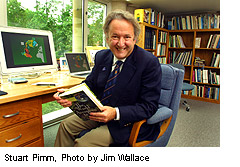
Well-Known Conservation Biologist Relocated To Nicholas School
By Monte Basgall
October 25, 2002 | DURHAM, NC -- In an accent that reveals his Derbyshire, England roots, ecologist Stuart Pimm doesn't mince words about humans' impact on the natural world.
"Half a century from now, unless we change what we are doing, we will have put on the path to extinction somewhere between a quarter to a third of all species," said Pimm, Duke's new Doris Duke Professor of Conservation Ecology.
Pimm, who arrived last summer at the Nicholas School of the Environment and Earth Sciences, is not bashful about sharing his message. He recently authored a book called The World According to Pimm (McGraw Hill, 2001), and even some of his fellow researchers are irritated by his willingness to engage reporters and lawmakers.
"I'm extremely critical of scientists who don't get involved," Pimm said during an interview under a live palm tree in his Nicholas School office. "That's because I'm a teacher of undergraduates and graduate students and post-docs. I give seminars all around the world. I often give public lectures.
"I'm supposed to draw a line and not talk to the media? I'm supposed to say, 'I'll educate everybody apart from politicians?' That makes absolutely no sense whatsoever."
Pimm came to Duke after about 20 years at the University of Tennessee at Knoxville and then Columbia. Over that interval, he has developed an international reputation in conservation, ecology and biodiversity.
His academic honors include Pew Scholar in Conservation and the Environment (1993), the Kempe Prize for Distinguished Ecologists (1994) and Aldo Leopold Leadership Fellow. He has written three books, repeatedly testified and briefed Washington officials, and can be frequently found on radio and TV.
As a measure of his influence, renowned Harvard biologist Edward O. Wilson and Intel co-founder Gordon E. Moore asked him to choose participants for a 2001 California conference of scientists, business leaders and economists on the extinction issue.
Pimm's personal evolution began at age 12, when he took up bird watching. He formally learned environmental science at Oxford. Then, kindled by an interest in deserts developed during two summers in Afghanistan, he went to the University of New Mexico to earn his Ph.D.
A "major shift" in his career came soon thereafter on a chance visit to Hawaii, where many plant and animal species have become extinct. That's where "I realized that massive loss of species was something that not only scientists could do something about, but scientists should," he said.
Since then, his investigations of habitat destruction - vividly described in The World According to Pimm - have taken him throughout the tropical and semitropical world. Still, Pimm is known for looking on the brightest side of a sullied picture. "I've worked consistently in very beaten, very damaged places, and I've come out of it with a sense of what we can achieve," he said.
The California conference he helped organize estimated that additional species losses could be circumvented in key pockets with about $25 billion in private sector funding. But to make that money work, "you have to have talented people trained in a whole diversity of different skills who are going to make particular parts of the planet their responsibility," he said.
That's why he is now at Duke, a university that "has long had an outstanding reputation in ecology," he added. With his new chair, he'll have "an opportunity to train other young men and women who are going to go and make sure these wonderful areas are protected and managed well."
On his first day teaching his Applied Population Ecology class at Duke, Pimm was still experiencing jetlag after attending the World Summit on Sustainable Development in Johannesburg. So he showed his new students a "highly opinionated" movie about a problem he personally faces in Africa: either too many elephants or too few. At the end of the film, Pimm told his class: "Two weeks from now I want you to tell me what your solution is."
"If I can't take all the students to Africa, the least I can do is share with them examples that are very real," he said later.
Actually, Pimm does plan for Duke students to accompany him to field sites in Africa, Brazil and Florida, as well as to Capitol Hill. He also expects to continue a tradition by holding spring "boot camps for biologists." Previously taught in Georgia's wilds, those classes will now move to the Duke Marine Laboratory.
"To do fieldwork, students have to learn to camp," he said. "They have to learn to look after themselves. More importantly, they have to learn to look after each other. And, at the same time, they have to write their term papers or do their research."
|





